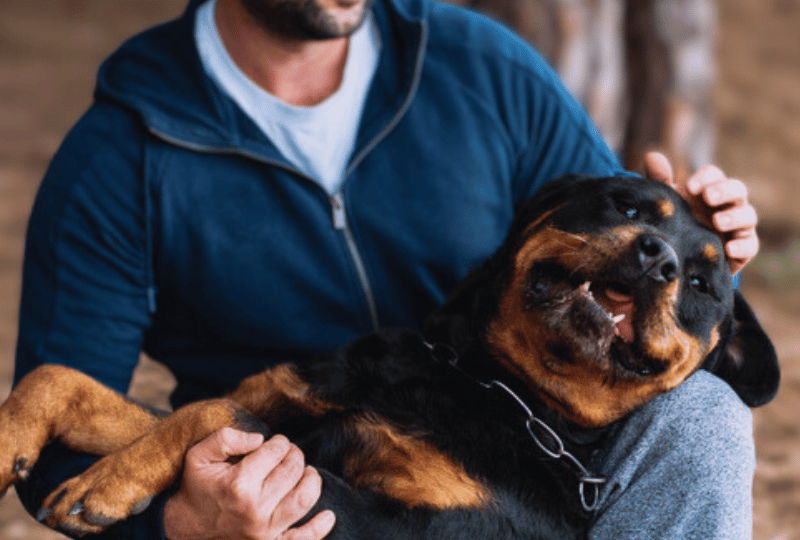If you’re the proud parent of a Rottie puppy you might be wondering if the energy will ever stop. We asked Dr. Nita Patel to explain when Rotties will start to slow down:
Rottweiler energy levels peak during puppyhood (0-24 months) and start to decline in adulthood (2-8 years). As their energy stabilizes, they still need regular exercise and mental stimulation. As seniors (8+ years), they experience a significant energy decline.
Factors like exercise, mental stimulation, and training influence their energy levels, and proper care can effectively manage their activity throughout their life stages.
We’ll take a closer look at each stage and delve into the factors contributing to their energy. We’ll also discuss some strategies you can use to help your Rottweiler calm down. Let’s get started!
Rottweiler Energy Levels By Age
As we mentioned above, every individual dog will be a little different when we’re talking about energy levels. There are so many factors that contribute to your dog’s overall zen (or lack thereof). Even so, age has a lot to do with when dogs calm down.
Puppyhood (0 – 24 months)
Puppyhood is an exhilarating time in a Rottweiler’s life. These little bundles of energy are born curious, playful, and eager to explore their surroundings.
Rottweiler energy levels are at their peak during this period, as they learn about the world around them, and discover their capabilities. They’ll eagerly jump, run, and play, often with seemingly endless energy. While this energetic phase is entirely normal and crucial for their physical and mental development, it can also be a handful for Rottweiler owners.
Just like any other puppy, Rottweilers will also take plenty of naps and breaks in between their burst of energy. As a responsible owner, it’s important that you provide a Rottweiler puppy with the right amount of both play and rest at this stage. Short walks, playtime, and interactive toys can help your dog channel their energy without working too hard. Puppy bodies are still developing and they shouldn’t exercise heavily.
In addition to exercise, you can also start early with basic obedience training. Not only can this lay a good foundation for a well-behaved adult Rottweiler, but it can also help your puppy calm down and focus. Positive reinforcement techniques, like praise and treats, work particularly well with Rottweilers.
Adulthood (2 – 8 years)
As Rottweilers transition from puppyhood to adulthood their energy levels, typically begin to decrease. Rottweilers are typically considered full-grown at about two years of age.
Shockingly, it may take some adults up to three years to reach their full adult weight. It’s around this time (2-3 years) that you can expect your Rottweiler to become more settled and composed in their energy levels. This doesn’t necessarily mean that they’ll be calming down, but they won’t continue to get more and more hyper at this age.
Even though adult Rottweilers are often less hyperactive than their puppy counterparts, they remain active and require regular exercise and mental stimulation. At this stage, you can adjust your exercise routines to accommodate their evolving needs.
The average adult Rottweiler needs at least 45 minutes of exercise per day. This exercise can come in the form of daily walks, short runs, play sessions, and maybe even advanced training exercises.
In adulthood, Rottweilers continue to benefit from socialization with other dogs in various environments. Well-socialized Rottweilers are typically more calm and less prone to anxiety or hyperactivity when exposed to new situations. They become more confident and adaptable, which contributes to their overall health and well-being.
Seniors (8 years +)
As a Rottweiler reaches eight years of age, they’re officially considered a senior. At this point, you’ll notice a drastic change in your Rottweiler energy levels. They’ve definitely calmed down from their puppy stage at this point and are more content with a sedentary lifestyle.
Senior Rottweilers require different care and attention to ensure their comfort and well-being. At this stage, their exercise needs decrease as they calm down, and you should adjust their routines to suit their aging bodies. Short, leisurely walks are usually sufficient to keep them both happy and healthy.
While it’s natural for senior Rottweilers to calm down, it’s also important to monitor your old dog’s health closely. Arthritis and other age-related conditions can affect their mobility and energy levels. Regular checkups with your veterinarian in the appropriate adjustments to the diet and routine can help maintain their quality of life. Just because your dog is old, doesn’t mean they have to suffer.
During these golden years, senior Rottweilers relish companionship and the warmth of their home. Though they’re not as active as they once were, they still benefit from interaction, affection, and the comfort of a loving owner.
Why Is My Rottweiler So Hyper?
Most adult Rottweilers aren’t described as hyper by their owners. Several factors can contribute to hyperactivity, and it is central to identify the root cause. Once you do, you’ll be able to help your Rottweiler calm down.
Not Enough Exercise
One of the most common reasons for Rottweilers being hyperactive is insufficient exercise.
As working dogs, this breed does have a good amount of energy to burn. Rotties are athletic dogs and need to move their bodies to feel good and act right! If they don’t get enough physical activity, they’ll find other ways to release their pent-up energy. This can often result in unruly behavior. When a huge, hundred-pound Rottweiler is excessively hyper, it’s usually not fun for anyone.
We mentioned above that adult Rottweilers need at least 45 minutes of exercise or play each day. If your hyper dog isn’t getting this, try incorporating exercise into your daily routine and watch them calm down.
Lack Of Enrichment
Rottweilers are very intelligent dogs and mental stimulation is just as important as physical exercise.
Without sufficient mental stimulation, they may become bored and engage in hyperactive or occasionally destructive behavior. You could provide a Rottweiler with puzzles, interactive, toys, and training sessions to help keep their minds active. That way, they don’t become anxious or nervous, and even more energetic than they once were.
Poor Impulse Control
Rottweilers are known for their protective instincts, which can sometimes lead to impulsiveness.
They have an incredibly strong instinct to protect and will put energy into this instinct if untrained. The protective impulse may cause your dog to react to a situation with excessive excitement, which can appear as hyperactivity.
Proper training is the best way to help your dog with poor impulse control. We’ll talk about a few training techniques specific to Rottweilers down below.
Medical Or Behavioral Issues
The last thing that might cause your dog to have excessive energy could be an underlying medical or behavioral issue. While medical issues aren’t common, they’re always an important factor to consider.
Some Rottweilers can be especially sensitive and experience separation anxiety when left alone for long periods of time. Anxiety can be displayed as an increase in energy levels or engagement in attention-seeking behaviors.
Like other large breed dogs, Rotties are also prone to problems like hip dysplasia, arthritis, and general joint issues. The pain they experience from these medical issues can cause them to be hyperactive and restless. You might notice your dog doesn’t want to sit or lay down and just stands or paces when they’re home.
Unspayed or unneutered Rotties can also experience hormone fluctuations that can make it hard for them to calm down. So if your Rottweiler is intact, expect some random bursts of energy throughout the day.
How Do I Get My Rottweiler To Calm Down?
If your Rottweiler isn’t calming down when you expect them to, there are several strategies you can employ to help them relax.
Exercise Daily
One of the most effective ways to reduce hyperactivity in Rottweilers is to provide them with regular and vigorous exercise. As mentioned plenty of times throughout this article, these dogs thrive on physical activity, and a tired Rottweiler is usually a well-behaved one. Daily walks, playtime, jogging, or hiking, are great ways to burn off their extra energy.
Provide Sensory Experiences
Rottweilers are naturally curious and love to engage in sensory experiences.
You can try providing your Rottweiler with a variety of scents, textures, and sounds to keep their minds engaged. This can be something as simple as taking them on a different walking path each day or taking them to an entirely new environment. Letting your dog explore new places is mentally stimulating and helps keep their minds calm.
For the overachievers, you can look into setting up a sensory game at home. Check out the video below for a little inspiration.
Train Your Dog
Another great way to manage your Rottweiler’s energy levels is to start training early.
Proper training is essential for many aspects of a Rottweiler’s life. Basic obedience training can help them understand commands and boundaries, and it also provides mental stimulation. Positive reinforcement techniques work well with Rottweilers as they respond to praise and rewards.
Rottweilers are pretty easy to train because of their intelligence levels. These dogs do have a stubborn streak but don’t worry because their drive to work and please usually overrides their stubbornness.
Once your dog is trained, you can use commands to help them focus and calm down if they’re getting too energetic.
Spay Or Neuter
One last thing you can consider to help your Rottweiler calm down is to have it spayed or neutered.
Among other benefits, spaying and neutering your dogs can help keep hormone levels from fluctuating. Ideally, this would keep your Rottweiler calmer and more emotionally stable all day long.
Is It Bad If My Rottweiler Has Too Much Energy?
It’s not inherently bad for a Rottweiler to have a lot of energy. These dogs are naturally active and their energy can be channeled into positive activities with proper training and care. But, if their energy levels aren’t adequately addressed, they can lead to behavior problems and affect their overall well-being.
Excessive energy without an outlet can result in destructive behaviors like chewing door frames or digging holes in the yard. For Rottweilers, excessive energy can also lead to heightened aggression and make your dog more reactive.
Is It Bad If My Rottweiler Isn’t Energetic?
On the other hand, if your Rottweiler lacks energy and seems lethargic, that could point to other types of issues.
Older adults and senior Rottweilers are naturally less active, so don’t worry if these dogs don’t always seem energetic. But younger dogs should have plenty of pep in their step still!
Low energy levels could indicate illness or discomfort in your dog. Low energy could also be a side effect of obesity which is common in Rottweilers.
If you notice a significant change in your Rottweiler energy levels, it’s important to consult with a veterinarian to rule out any medical issues. A veterinarian can provide a proper diagnosis and recommend the necessary treatments to help your dog regain their vitality.
Final Thoughts
Rottweilers are known for their playful natures, but as they grow from puppyhood to adulthood, and eventually into their senior years, their energy levels change.
Typically, puppies and young adults have the most energy. After about 2 to 3 years of age, Rottweilers eventually start to calm down, and their energy levels out. Understanding the factors that contribute to hyperactivity can also help you understand if your Rottweiler’s energy levels are normal or not.
Hopefully, this article has given you some insight into when you can expect your Rottweiler to calm down and has offered you tips to manage excess energy!


